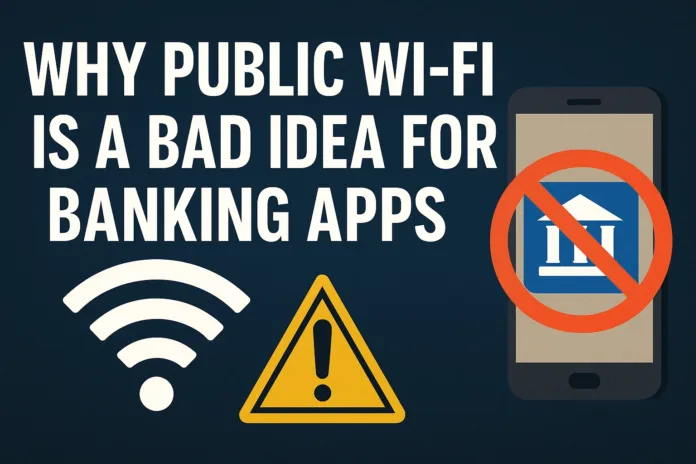The Article Tells The Story of:
- Public Wi-Fi Puts Your Bank Account at Risk: One careless login could expose your financial data.
- Hackers Lurk on Free Networks: Fake hotspots and packet sniffing make stealing your credentials easy.
- Even HTTPS Isn’t Always Safe: Encryption can fail if the connection is compromised early.
- VPNs Help, But Aren’t Bulletproof: You’re safer—but still far from invincible.
Table of Contents
Why You Should Avoid Public Wi-Fi for Banking Apps
Public Wi-Fi networks are everywhere—from coffee shops and airports to shopping malls and libraries. They’re convenient, free, and easy to access. But they’re also one of the biggest threats to your financial security if you’re using banking or money-related apps.
At Squaredtech, we want you to understand the real risks behind that “Free Wi-Fi” login screen. Below, we break down exactly why public internet connections can be dangerous for your banking activities, what the pros and cons are, and what you should do instead.
Read More About Our Article of Hackers Launder Bybit’s Stolen Crypto Worth $1.4 Billion Published on March 5th, 2025 SquaredTech
What’s Wrong With Public Wi-Fi?
Public internet connections are often unencrypted or poorly secured. This makes it easy for hackers to intercept your data. When you access sensitive apps like online banking or stock trading platforms over a public network, you’re opening the door to potential data theft, fraud, or even full account takeovers.
Major Risks:
- Man-in-the-middle attacks: Hackers can sit between your device and the internet, capturing everything you send—including login credentials and financial data.
- Fake hotspots: Attackers can create networks with names like “Free Airport Wi-Fi,” tricking users into connecting and unknowingly giving up access to their private data.
- Session hijacking: If you log in to your bank or PayPal account, attackers can steal your session tokens and act as you—without needing your password.
- Packet sniffing: Tools like Wireshark allow anyone on the same network to “listen” to your internet traffic, especially on unencrypted sites or apps.
The Few Pros (That Still Don’t Justify the Risk)
Yes, public Wi-Fi has its upsides. But none of them are worth risking your money for.
- Free and fast access: You save on data and get online quickly.
- Convenient in emergencies: If you lose mobile data or need to check an urgent email, it can be a short-term solution.
However, even these benefits can be replicated with safer alternatives like mobile hotspots or VPNs.
Read More About Our Article of Protect Your Family’s Privacy: This AdGuard Deal is Too Good to Miss! Published on February 19th, 2025 SquaredTech
The Real Cost: What Could Go Wrong
You might think, “I’ve used banking apps on public Wi-Fi before—nothing happened.” But it only takes one session for an attacker to compromise your device or account. Here’s what can go wrong:
- Account takeover: A hacker gains control of your bank or PayPal account and transfers funds before you can react.
- Identity theft: With access to personal information, attackers can open credit accounts or take out loans in your name.
- Device compromise: Malware or keyloggers can be injected during your public session, allowing attackers to monitor your activities long after you leave the Wi-Fi zone.
- Financial app vulnerabilities: Even trusted apps can have security flaws. Combined with weak Wi-Fi protection, the risk increases exponentially.
Squaredtech’s Safe Alternatives
Instead of relying on open Wi-Fi networks, Squaredtech recommends these secure options:
- Mobile data: Use your smartphone’s cellular connection. It’s encrypted and far more secure.
- Personal hotspot: Share your mobile data with your laptop or tablet via hotspot. It’s safer and under your control.
- VPN (Virtual Private Network): If you absolutely must use public Wi-Fi, use a reliable VPN to encrypt your traffic and hide your IP.
- Banking app protections: Make sure your apps have two-factor authentication (2FA), use biometric login, and are updated regularly.
- Firewall and antivirus software: Keep your devices protected from known threats.
Final Verdict: Don’t Use Public Wi-Fi for Banking—Period
At Squaredtech, our advice is simple: never use public Wi-Fi for banking, trading, or anything involving personal financial data. The risks far outweigh the minor convenience. Hackers thrive in these environments, and once your data is exposed, recovering your funds—or your identity—can be a nightmare.
Use your mobile network or a personal hotspot. If you absolutely must connect over public Wi-Fi, make sure to use a VPN, and avoid accessing any sensitive apps or websites.
Convenience is great. But security is better.
Stay Updated: Tech News


